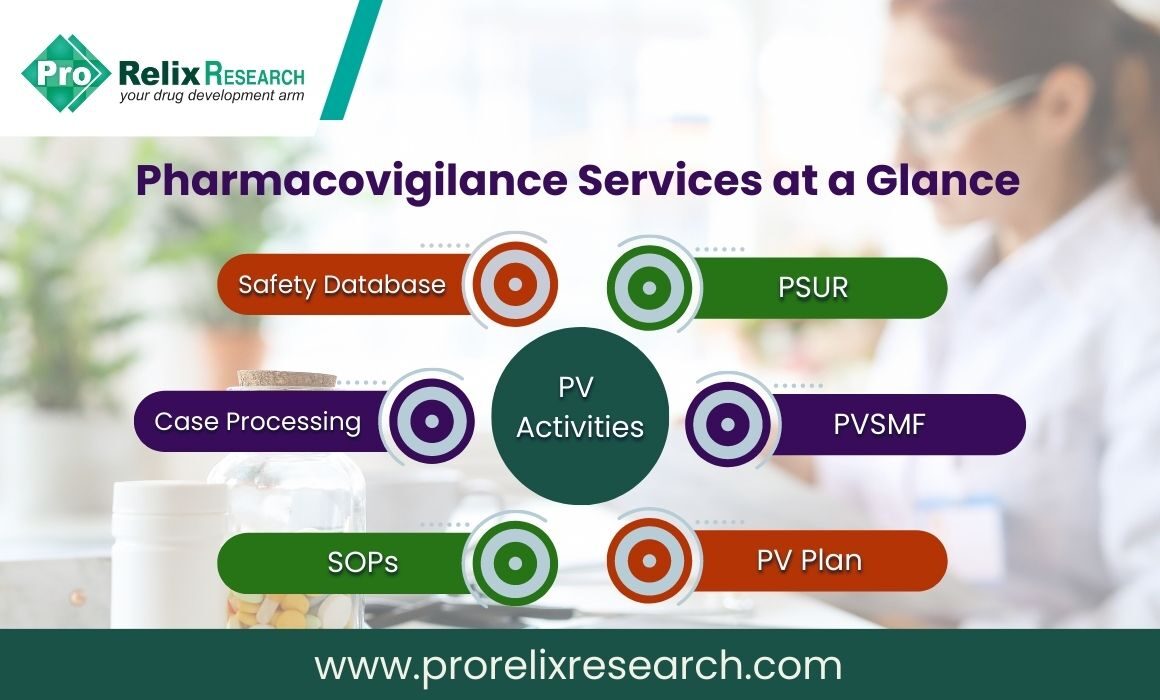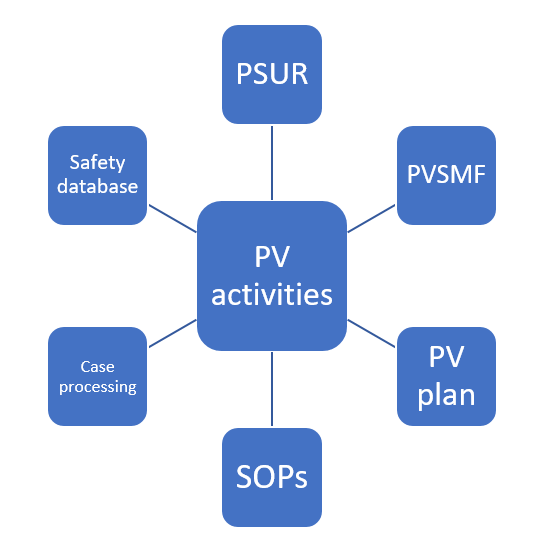Ensuring the safety and efficacy of new drugs, medical devices, and biological products does not end once the treatment is approved or is on the market but extends to the post-marketing phase. Since the overarching goal of all new approvals is to advance therapies for certain diseases and conditions in a safe manner, pharmacovigilance activities occupy a vital role in the product lifecycle.
Pharmacovigilance (PV) refers to the science and activities related to the detection, assessment, understanding, and prevention of adverse events or any drug-related safety problems. By monitoring safety signals and adverse events associated with health products, sponsors and regulatory authorities can decide on the fate of the products and thereby safeguard the health of patients and maintain public health. Various PV activities are essential in characterizing the risk-benefit profile of products and are necessary to be submitted to regulatory authorities as part of ongoing programs both during development and after marketing approval (Figure 1).
Figure 1. Pharmacovigilance (PV) activities during product lifecycle
Periodic safety update report (PSUR)
A PSUR is a comprehensive document that provides a detailed analysis of the safety profile of a drug product and is required by regulatory authorities at define time points after marketing authorization. It collates safety information from various sources and presents the risk-benefit profile of the product to regulatory authorities that ultimately determine the fate of the product and the need for further investigations into its safety.
ProRelix Research can help conduct the following activities for the development of PSURs for your product:
- Comprehensive search to identify safety information from various sources such as clinical trials, registries, post-marketing data, and literature sources
- Submission of PSURs to regulatory authorities as per predefined timelines post-marketing of the product
- Development of PSURs as per the content required for a particular regulatory authority
- Statistical analysis and data mining for individual case safety reports (ICSRs) to asses and analyse signals
- Development, assessment, and periodic review of risk management plans and risk minimization strategies
- Provide responses to regulatory agencies and submit any additional information required
Pharmacovigilance System Master File (PVSMF)
The PVSMF provides information about the organization, processes, procedures, and responsibilities related to the collection, assessment, and reporting of adverse drug reactions (ADRs) and drug-related safety information. It is essentially an overview of the PV system of the sponsor and ensure safe use of the product.
We can help develop a PVSMF for your drug product as per regulatory authority guidelines by assisting with the following:
- Content development for a PVSMF including details such as organization and personnel, PV activities, quality management, safety databases, training and education, and regulatory authority communications and meetings
- Regular and periodic updates to PVSMF in accordance with organizational and regulations changes
- Preparation of PVSMF for inspection and audits by regulatory authorities
Pharmacovigilance (PV) plan
A PV plan is developed by a sponsor prior to the products market approval and contains the strategies, processes, and activities that will be used to ensure safety monitoring including detection, assessment, and management of ADRs and safety concerns.
A comprehensive PV plan is critical and should be developed with care. ProRelix research can support with development of a customized PV plan with the following features:
- Development of a risk management plan including risk identification, evaluation, and minimization
- Creation of safety data collection methods including ADR reporting, case processing, development of PSURs, and data analysis
- Assistance with development of processes for signal detection such as review of ICSRs, data mining of safety databases, literature monitoring
- Preparation of safety dissemination information such as educational materials, changes to product labelling, and safety alerts
- Communication and updating regulatory authorities on changes to PV plans
Standard Operating Procedures (SOPs)
Pharmacovigilance SOPs provide a detailed written instruction on steps, processes, and protocols necessary for carrying out various PV activities. SOPs ensure consistency and uniformity in performance of PV activities as per regulatory requirements.
We help in the development of SOPs to achieve your PV goals that are aligned with internal company processes and regulatory requirements for various activities such as:
- Adverse event reporting and processing
- Safety surveillance and monitoring
- Signal detection and management
- Risk assessment and risk minimization strategies
- Safety information dissemination and communication
- PV agreements
- PV Quality management systems (QMS)
- PV inspections and audits
Case processing
Case processing involves the systematic and standardized handling of ICSRs and allows for the detection of new safety concerns and ongoing evaluations of benefit-risk profiles of a product. It includes assessment, documentation, and communication of safety data.
ProRelix Research can help with the different steps involved in case processing such as:
- Categorization of ICSRs from various sources based on seriousness and quality
- Support with data entry into safety management systems including vital patient and safety event information
- Thorough quality review process for assessment of data accuracy and completion
- Causality assessment and degree of serious of the AE
- Help in coding of adverse events using standardization dictionaries such as Medical Dictionary for Regulatory Activities (MedRA)
- Comoilation and submission of ICSRs to regulatory authorities
- Development of case narratives
- Archiving and maintenance of case processing activities
Safety database
A PV safety database is a central repository of ICSRs and must be created in accordance with regulatory guidelines. It serves as an accurate and secure source of safety data for a product and provide information on safety signals for risk-benefit analysis.
ProRelix Research can help in the development of a reliable and secure database for your product through the following services:
- Assistance in database design and structure that helps to capture and store relevant safety signals and information
- Creation of validation checks and systems to minimize problems with data entry
- Utilization and integration of coding systems such as MedRA into the safety database
- Inclusion of data security, access controls, and encryption measures to prevent unauthorized access to patient information






